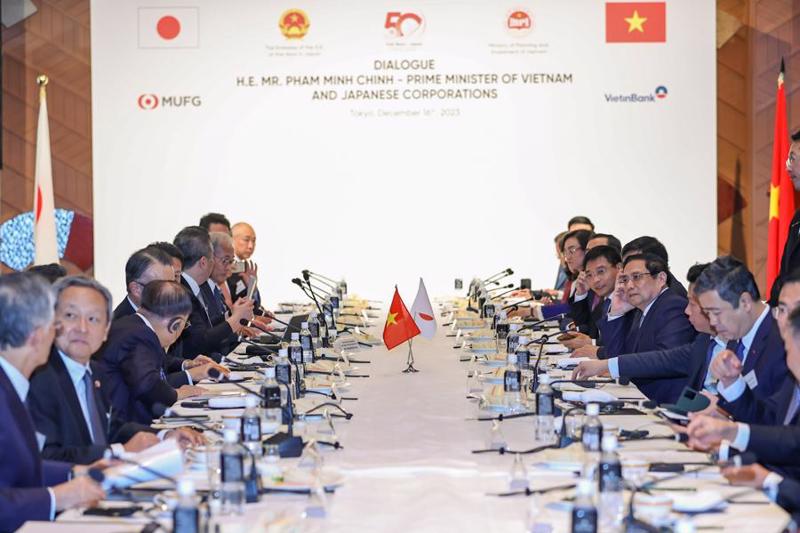Prime Minister Pham Minh Chinh and leaders of Vietnamese ministries, agencies and localities attended a dialogue with major Japanese economic corporations on green transition and social infrastructure in Tokyo on December 16, as part of his working trip to Japan for attendance at the Commemorative Summit for the 50th Year of ASEAN- Japan Friendship and Cooperation and bilateral activities, according to a report from the Vietnam News Agency.
The two sides discussed practical and feasible solutions to boost bilateral trade and investment cooperation, especially in emerging areas.
The Vietnamese side provided feedback on each specific proposal and idea put forth by Japanese corporations regarding the development of renewable energy, green transformation in transport infrastructure, policies on electric vehicles, social infrastructure, health care, education, incentives for supporting industries, and settlement of difficulties faced by specific projects.
They hoped that both sides will continue upholding the role of business dialogue mechanisms, especially the Vietnam-Japan Joint Initiative, to deal with new challenges in business operations on the principle of equal partnership.
In his speech, PM Chinh told them that so far this year, Vietnam has posted a trade surplus of around $25 billion, drawn roughly $30 billion in registered foreign direct investment (FDI) and disbursed some $20 billion. The country also exported around 8 million tons of rice, helping to ensure global food security.
Vietnam will continue ensuring fundamental factors for development and further reduce compliance time, input and logistics costs, thus improving its business competitiveness, he said, adding that with the policy of selectively attracting FDI with a focus on quality, efficiency, modern technology, and environmental protection, Vietnam gives priority to attracting projects in green economy, digital economy, circular economy, knowledge-based economy, sci-tech, innovation, electronic components, electric cars, as well as potential core technologies like semiconductor industry, new energy such as hydrogen, renewable energy, financial centre development, green finance, biotechnology, and health care.
The Vietnamese leader suggested major Japanese corporations assist Vietnam in accessing new-generation official development assistance (ODA), green finance for energy transition within the framework of the Just Energy Transition Partnership (JETP) and the "Asia Zero Emission Community (AZEC),” and investment resources for innovation, such as the Japanese Government's "Innovation/Digital Transformation Fund", aimed at providing impetus for sustainable socio-economic development in the coming time.
He also proposed Japanese investors further enhance collaboration in high-quality human resources training, share experience in management and developing business culture, step up research and development activities, innovation and technology transfer, contributing to the improvement of the resilience of supply chains to ensure stable production operations.
With the spirit of "harmonizing interests, sharing risks," the Vietnamese Government will always accompany, listen to, support and create favorable conditions for foreign investors and those from Japan in particular to do business successfully and sustainably in the long term in Vietnam, he said.
At a working breakfast with leaders of the top 10 Japanese microchip companies on the same day, PM Chinh assured them that amid the ongoing global economic downturn, Vietnam stands as a safe haven, offering favorable conditions for businesses to invest and operate stably and efficiently.
The development based on science-technology, including digital transformation and semiconductor industry, is an objective requirement, a strategic choice and a top priority of Vietnam, he affirmed.
To advance the semiconductor industry, he said, Vietnam focuses on developing hard and soft infrastructure, technological and social infrastructure, facilitating the attraction and transfer of science-technology, training human resources, building transparent goals and policies, and smart governance.
To make breakthroughs in the semiconductor industry, PM Chinh called on the Japanese enterprises to invest in Vietnam, including establishing research and development centers, grooming top-notch talents, building manufacturing facilities, all aimed at integrating Vietnam into global supply chains.
On this occasion, the Vietnamese Government leader hosted a reception for Japanese Minister of Economy, Trade and Industry Ken Saito, during which he suggested launching Vietnam-Japan cooperation in semiconductor manufacturing, chip design, artificial intelligence, big data, and more. He also welcomed Japanese businesses investing in semiconductor chip production in Vietnam.
He proposed Japan consider and continue opening its market for Vietnamese fresh fruits, encourage more Japanese businesses to shift their investments and production supply chains to Vietnam, especially in key and support industries; enhance collaboration to fuel green transformation in Vietnam's pillar manufacturing sectors.
Calling for effectively carrying out activities of the AZEC Promotion Working Team in the coming time, he said there is the need to soon sign a cooperation agreement on energy transition to concretize Vietnam's energy transition roadmap.
Receiving Chairman and CEO of the Japan External Trade Organization (JETRO) Ishiguro Norihiko, the PM suggested JETRO continue working with Vietnamese agencies to popularize Vietnam’s images, business environment and opportunities to major Japanese corporations and enterprises.
The Prime Minister encouraged Japanese businesses to increase their investments in Vietnam and provide assistance in developing supporting industries, innovation linked to technology transfer, especially high-tech, green, and clean technologies.









 Google translate
Google translate